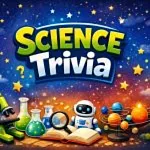Nouns That Start With E (With Types and Example Sentences)
Did you know that the letter E is the most common in the English language? Yes, we are surprised, too. As children move one step ahead with learning new things, let’s get ready for a delightful journey as we delve into the wonderful world of nouns and kid’s vocabulary. Nouns are one of the friendliest parts of speech in English grammar. Thus, we have handcrafted this post on nouns that start with E for preschoolers and kids in English. As parents, educators, or little adventurers in the realm of language, you’re about to discover a treasure trove of ‘E’ words that are educational and exciting!
What Is a Noun?
In simple terms, noun is word that refers to a place, thing, animal, person, an idea, or concept. Nouns can play the role of a subject, an object, a modifier, and more in a sentence. For example, noun can be a word that represents a place (Bangkok), a thing (robot), an animal (rabbit), an idea (adventure), an emotion (sadness), or a person (Mother Teresa).
List of Some Commonly Known Nouns That Start With E
As children expand their knowledge on nouns, keeping them updated with a variety of vocabulary is also essential. Let’s explore some commonly known nouns that start with letter ‘E’ and make learning easier.
1. Earth: The planet we live on, third from the Sun.
Example: The Earth revolves around the Sun once every 365 days.
2. Echo: A sound that is reflected off a surface and heard again.
Example: The echo of his voice filled the empty hall.
3. Edge: The outside limit of an object, area, or surface.
Example: She carefully walked along the edge of the cliff.
4. Education: The process of receiving or giving systematic instruction.
Example: Her education is very important to her family.
5. Effort: A vigorous or determined attempt.
Example: He put a lot of effort into finishing the project on time.
6. Eggplant: A purple, spongy, absorbent fruit used as a vegetable in cooking.
Example: She added sliced eggplant to the curry for extra flavor.
7. Election: A formal and organized choice by vote of a person for a political office or other position.
Example: The election results shall be announced tonight.
8. Electricity: A form of energy resulting from the existence of charged particles.
Example: The storm caused a major electricity outage in the city.
9. Elephant: A large mammal with a long trunk and tusks.
Example: An elephant can remember the way to water sources for many years.
10. Elevator: A platform or compartment housed in a shaft for raising and lowering people or things to different floors or levels.
Example: We took the elevator to the 10th floor.
11. Emotion: A natural instinctive state of mind deriving from one’s circumstances, mood, or relationships with others.
Example: Joy is a powerful emotion that can uplift your spirit.
12. Empire: An extensive group of states or countries under a single supreme authority.
Example: The Roman Empire was one of the largest in history.
13. Employee: A person employed for wages or salary.
Example: The employee of the month gets a special parking spot.
14. Energy: The strength and vitality required for sustained physical or mental activity.
Example: After a good night’s sleep, she was full of energy.
15. Engine: A machine with moving parts that converts power into motion.
Example: The car’s engine needs to be repaired.
16. Enthusiasm: Intense and eager enjoyment, interest, or approval.
Example: Her enthusiasm for the project was contagious.
17. Environment: The surroundings or conditions in which a person, animal, or plant lives or operates.
Example: Protecting our environment is crucial for the future.
18. Episode: An event or a group of events occurring as part of a larger sequence.
Example: The final episode of the series airs tonight.
19. Error: A mistake.
Example: The document contained several spelling errors.
20. Estate: An extensive area of land in the country, usually with a large house, owned by one person, family, or organization.
Example: They live on a sprawling country estate.
Different Types of Nouns That Begin With E
When exploring nouns starting with E, it’s fascinating to discover the variety they encompass. From concrete nouns like ‘elephant’ and ‘egg’ that you can touch and see, to abstract nouns like ‘enthusiasm’ and ‘equality’ representing concepts or feelings, the English language offers a rich array of nouns beginning with ‘E’. Each type serves a unique purpose in our language, allowing us to convey detailed and nuanced ideas.
Common Nouns That Start With E
Common noun refers to the generic names given to names, places, animals, things in a class or a group. Common nouns are not capitalised.
Delving further into our alphabetical exploration, we now focus on common noun words that start with ‘E’. Here are some everyday nouns you often hear and use, making them easier to practice:
1. Envelope: A flat paper container with a sealable flap, used to enclose a letter or document.
Example: She sealed the letter in the envelope.
2. Engineer: A person who designs, builds, or maintains engines, machines, or structures.
Example: An engineer was called to fix the bridge.
3. Evening: The period of time at the end of the day, usually from about 6 p.m. to bedtime.
Example: They enjoy walks in the cool evening
4. Eagle: A large bird of prey with a powerful beak and sharp talons, noted for its keen sight.
Example: An eagle soared high above the mountains.
5. Entry: An act of going or coming in.
Example: The main entry to the building was blocked.
6. Economy: The wealth and resources of a country or region, especially in terms of the production and consumption of goods and services.
Example: The country’s economy is growing fast.
7. Era: A long and distinct period of history with a particular feature or characteristic.
Example: The Victorian era was known for its innovations.
8. Example: A thing characteristic of its kind or illustrating a general rule.
Example: She set a good example for the other students.
9. Expert: A person who is very knowledgeable about or skillful in a particular area.
Example: We need an expert to solve this complex problem.
10. Episode: A single event or group of related events occurring as part of a larger sequence.
Example: This is the final episode of the season.
More Common Nouns That Begin With Letter E
As we continue to enrich our vocabulary, let’s dive deeper into the pool of common nouns beginning with the letter ‘E’. Whether for creative writing, conversation, or academic purposes, these nouns are valuable additions to your linguistic arsenal.
| Echo | Expertise |
| Elixir | Editor |
| Entity | Emergency |
| Essence | Episode |
| Exodus | Event |
| Eclipse | Exposure |
| Elm | Education |
| Entry | Emotion |
| Estate | Epoch |
| Expense | Evidence |
| Edge | Extension |
| Emblem | Estimate |
| Envelope |
Abstract Nouns That Start With E
Abstract nouns represent intangible elements like feelings, qualities, or states of being, like sadness, empathy, etc. Here, we explore a selection of these thought-provoking abstract nouns that start with ‘E’, each with a brief definition and an illustrative example:
1. Empathy: The ability to understand and share the feelings of another.
Example: Her empathy for the homeless inspired her to volunteer at the shelter.
2. Envy: A feeling of discontented or resentful longing aroused by someone else’s possessions or qualities.
Example: He felt a strong envy towards his successful friend.
3. Elegance: The quality of being graceful and stylish in appearance or manner.
Example: The dancer moved with such elegance and poise.
4. Ethics: Moral principles that govern a person’s behavior or the conducting of an activity.
Example: The company prides itself on its strong ethics.
5. Eternity: Infinite or unending time.
Example: They promised to love each other for eternity.
6. Euphoria: A feeling or state of intense excitement and happiness.
Example: Winning the award filled her with euphoria.
7. Evolution: The gradual development of something, especially from a simple to a more complex form.
Example: The evolution of technology is incredibly fast-paced.
8. Excellence: The quality of being outstanding or extremely good.
Example: The chef’s work is a testament to culinary excellence.
9. Expectation: A strong belief that something will happen or be the case in the future.
Example: The expectation of a positive outcome kept them going.
10. Enlightenment: The state of gaining spiritual knowledge or insight.
Example: His journey to the East brought him enlightenment.
More Abstract Nouns That Begin With E
Abstract nouns conver concepts, emotions, and ideas to express the intangible aspects of our world and experiences. Here’s an expanded list to enhance your understanding:
| Eagerness | Elation |
| Efficiency | Emancipation |
| Elation | Entity |
| Enmity | Excitement |
| Exuberance | Ecstasy |
| Earnestness | Elegy |
| Egoism | Embarrassment |
| Eloquence | Equality |
| Enthusiasm | Exclusion |
| Excess | Education |
| Ease | Empowerment |
| Equilibrium | Empathy |
| Exhaustion |
Positive Nouns That Start With E
In simple terms, positive nouns are those nouns that uplift the mood and confidence. These nouns offer words of encouragement, joy, and success, reminding us of the good and beautiful in the world. Here’s a selection of uplifting ‘E’ nouns, each with a definition and an example to inspire positivism:
1. Enchantment: The state of being under a spell magic.
Example: The forest was filled with a sense of enchantment.
2. Euphoria: An intense feeling of happiness or excitement.
Example: Winning the championship was a moment of pure euphoria.
3. Expertise: Specialized skill or knowledge in a particular field.
Example: Her expertise in the subject was well-respected.
4. Excellence: The quality of being outstanding or extremely good.
Example: The artist’s work is known for its excellence.
5. Endearment: A word or phrase expressing love or affection.
Example: Grandma’s endearments always made us feel loved.
6. Enthusiasm: Intense and eager enjoyment, interest, or approval.
Example: His enthusiasm for the project was contagious.
7. Elation: Great happiness and exhilaration.
Example: Her elation was evident when she heard the good news.
8. Empowerment: The authority or power given to someone to do something.
Example: The training program was designed for women’s empowerment.
9. Ease: Absence of difficulty or effort.
Example: He completed the task with remarkable ease.
10. Esteem: Respect and admiration, typically for a person.
Example: The teacher held the highest esteem among her students.
More Positive Nouns That Start With Letter E
Positive nouns bring a sense of optimism, achievement, and joy in communication. Let’s explore some more commonly known positive nouns to expand the vocabulary:
| Elation | Excitement |
| Enlightenment | Expertise |
| Enthusiasm | Empowerment |
| Exaltation | Enthusiast |
| Expediency | Epiphany |
| Elegance | Exuberance |
| Enrichment | Exploration |
| Enticement | Encouragement |
| Excellence | Entitlement |
| Experience | Equality |
| Empathy | Exultation |
| Enterprise | Exquisiteness |
| Entity |
Proper Nouns That Start With E
Proper nouns refer to specific names of people, places, or things, including personal names, names of organisations, place names, and the titles of songs, movies, books, and other forms of media. These are always capitalised. Let’s explore some of these ‘E’ proper nouns, each with a brief definition and an example to illustrate their significance in our daily communication.
1. Egypt: A country in North Africa known for its ancient civilization and monumental architecture.
Example: The Pyramids of Egypt are among the most iconic wonders of the world.
2. Einstein: The surname of Albert Einstein, a theoretical physicist known for the theory of relativity.
Example: Einstein’s contributions to science changed our understanding of the universe.
3. Elizabeth: A common given name, historically associated with Queen Elizabeth of England.
Example: Queen Elizabeth II has had a long and historic reign.
4. Everest: The highest mountain peak in the world, located in the Himalayas.
Example: Climbers from around the world dream of reaching the summit of Everest.
5. Eiffel Tower: A landmark iron lattice tower located in Paris, France.
Example: The Eiffel Tower lights up beautifully at night.
6. Ecuador: A country in South America known for its diverse landscape including the Amazon rainforest.
Example: Ecuador is home to many rare species of plants and animals.
7. Edinburgh: The capital city of Scotland, known for its historic and cultural attractions.
Example: Edinburgh is famous for its annual arts festival.
8. Euros: The official currency used in many countries of the European Union.
Example: We exchanged our dollars for Euros before the trip.
9. Eton: A prestigious boys’ school in England known for its high academic standards.
Example: Many of Britain’s leaders were educated at Eton.
10. Erie: A lake between the United States and Canada, one of the Great Lakes.
Example: Lake Erie is known for its beautiful sunsets and recreational activities.
More Proper Nouns That Begin With E
Proper nouns that start with ‘E’ stand out as unique identifiers for specific people, places, or organizations. Continuing our exploration of the alphabet, we now present more proper nouns starting with ‘E’.
| Edinburgh | Ethiopia |
| Exeter | Everton |
| Ellis | Everest |
| Erie | Ebay |
| Eritrea | Emerson |
| England | Egypt |
| Emerson | Elba |
| Eindhoven | Esmeralda |
| Eurostar | Easter |
| Ecuador | Eton |
| Elsinore | Epson |
Countable Nouns That Start With E
Countable nouns are those that can be quantified as individual items. Countable nouns that start with ‘E’ refer to things that we can count individually, offering a tangible sense of quantity and specificity in our language. Let’s explore some of these countable ‘E’ nouns, each accompanied by a definition and an illustrative example.
1. Egg: An oval or round object laid by a female bird, reptile, fish, or invertebrate.
Example: She bought a dozen eggs for the recipe.
2. Envelope: A flat paper container with a sealable flap, used to enclose a letter or document.
Example: He sent the invitation in a fancy envelope.
3. Echo: A sound or series of sounds caused by the reflection of sound waves from a surface back to the listener.
Example: The echo in the cave was loud and clear.
4. Earring: A piece of jewelry worn on the lobe or edge of the ear.
Example: She lost one of her favorite earrings at the party.
5. Employee: A person employed for wages or salary, especially at non-executive level.
Example: The company has over 100 employees.
6. Estate: An area or amount of land or property.
Example: His estate was divided among his heirs.
7. Edition: A particular form or version of a published text.
Example: She collects first editions of classic novels.
8. Essay: A short piece of writing on a particular subject.
Example: He wrote an essay on the impact of social media.
9. Eagle: A large bird of prey with a massive hooked bill and long broad wings.
Example: An eagle soared above the mountain peak.
10. Episode: An event or a series of events occurring as part of a larger sequence; also, a separate program or section of a series on television or radio.
Example: Did you watch the latest episode of the show?
More Countable Nouns Beginning With Letter E
Here’s an extended list of countable ‘E’ nouns to further expand your vocabulary and enhance your ability to articulate quantities and specifics.
| Echo | Episode |
| Eyebrow | Espresso |
| Envelope | Earring |
| Eagle | Eyelash |
| Elevator | Exhibition |
| Essay | Element |
| Estimate | Encyclopedia |
| Exponent | Employee |
| Eel | Elm |
| Exam | Export |
| Estate | Emoji |
| Escalator | Excerpt |
| Eyeglass |
Uncountable Nouns That Start With E
Uncountable nouns refer to substances, concepts, abstract ideas, or physical objects that can’t be counted individually. Let’s explore some of these uncountable ‘E’ nouns, each with its definition and an example to provide context.
1. Education: The process of receiving or giving systematic instruction.
Example: A good education is the foundation for a successful future.
2. Electricity: A form of energy resulting from the presence and flow of electric charge.
Example: The city was without electricity for six hours after the storm.
3. Enthusiasm: Intense and eager enjoyment, interest, or approval.
Example: Her enthusiasm for the project was infectious.
4. Evidence: The available body of facts or information indicating whether a belief or proposition is true or valid.
Example: The jury considered all the evidence before reaching a verdict.
5. Expertise: Specialized skill or knowledge in a particular field, typically acquired over time.
Example: Years of practice have given him considerable expertise in woodworking.
6. Equality: The state of being equal, especially in status, rights, or opportunities.
Example: The organization promotes equality for all citizens.
7. Elegance: The quality of being graceful and stylish in appearance or manner.
Example: The ballroom was noted for its elegance and beauty.
8. Ethics: Moral principles that govern a person’s behavior or the conducting of an activity.
Example: Medical professionals are often guided by strict ethics.
9. Endurance: The ability to withstand hardship or adversity; especially, prolonged physical or mental effort.
Example: The marathon runner showed great endurance.
10. Envy: A feeling of discontented or resentful longing aroused by someone else’s possessions, qualities, or luck.
Example: Envy can be a destructive emotion if not managed properly.
More Uncountable Nouns That Begin With E
Diving deeper into the realm of the immeasurable, here are some more uncountable nouns that begin with the letter ‘E’ to further enrich your vocabulary.
| Enjoyment | Expertise |
| Enthusiasm | Emphasis |
| Ecstasy | Education |
| Erosion | Empathy |
| Eloquence | Entropy |
| Electricity | Ethics |
| Economics | Elegance |
| Enchantment | Evidence |
| Evolution | Equality |
| Endurance | Exasperation |
| E nvironment | Exhaustion |
| Envy | Entertainment |
| Enlightenment |
Infographic
FAQs
1. What is the significance of teaching nouns starting with E to your child?
Teaching nouns starting with ‘E’ helps broaden your child’s vocabulary, enhances their linguistic understanding, and aids in their overall cognitive development by familiarizing them with a variety of words.
2. How can you make learning nouns that begin with ‘E’enjoyable for kids?
You can make learning nouns that begin with ‘E’ enjoyable for kids by incorporating interactive games, engaging storytelling, visual aids, and encouraging them to relate these words to their everyday experiences.
Exploring nouns that start with ‘E’ opens up a world of language and learning for both children and adults. By understanding and using these words, we can enrich our conversations, strengthen our communication skills, and deepen our understanding of the world. Embracing this journey of discovery not only builds a robust vocabulary but also fosters a lifelong love for the beauty and complexity of language.
Was This Article Helpful?
Parenting is a huge responsibility, for you as a caregiver, but also for us as a parenting content platform. We understand that and take our responsibility of creating credible content seriously. FirstCry Parenting articles are written and published only after extensive research using factually sound references to deliver quality content that is accurate, validated by experts, and completely reliable. To understand how we go about creating content that is credible, read our editorial policy here.





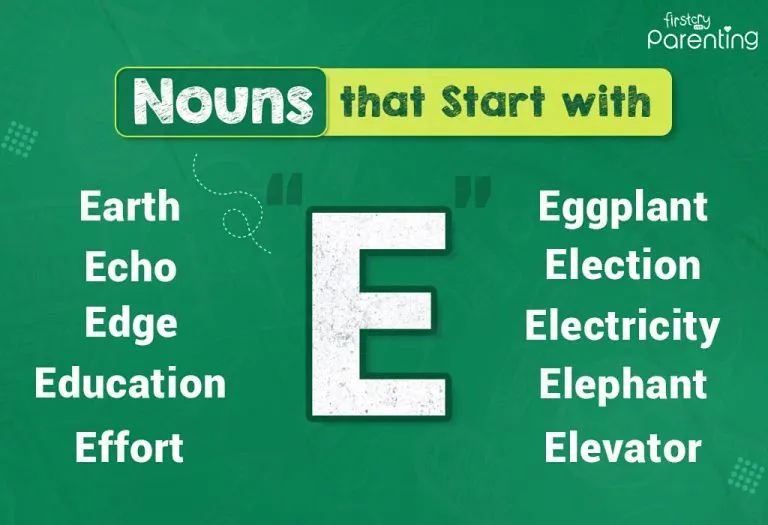
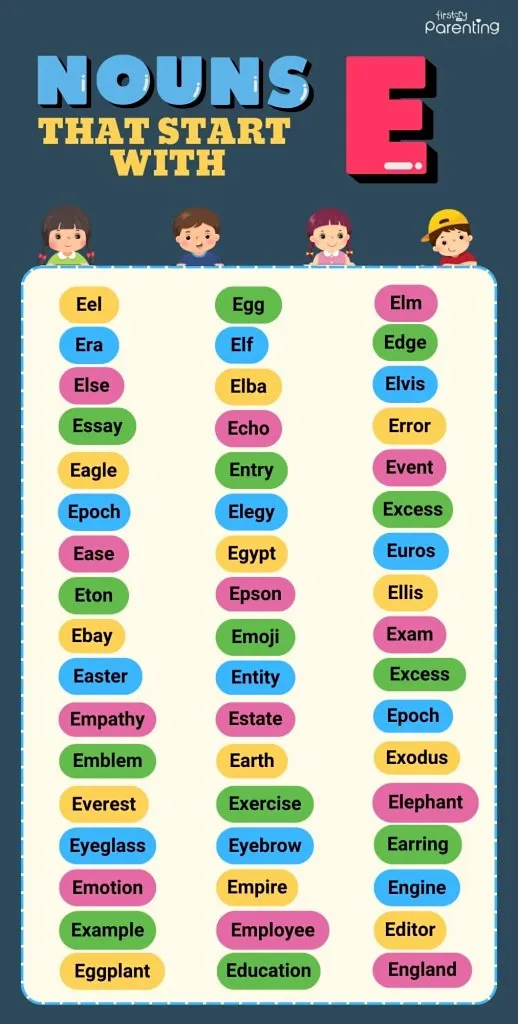

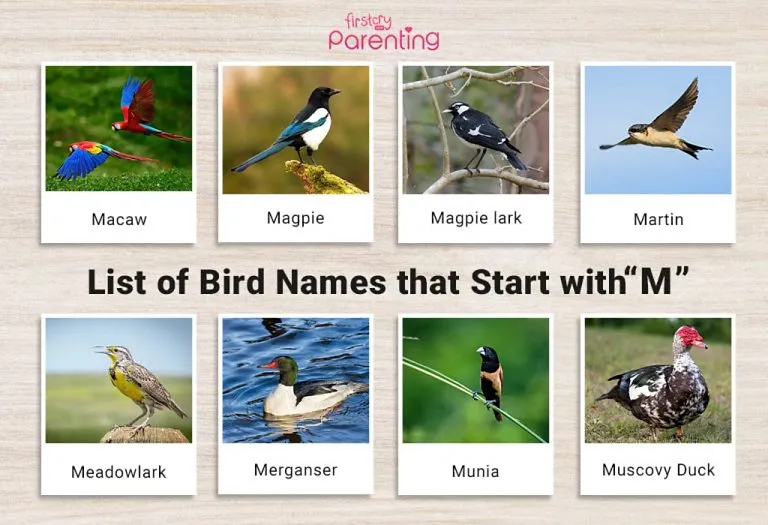
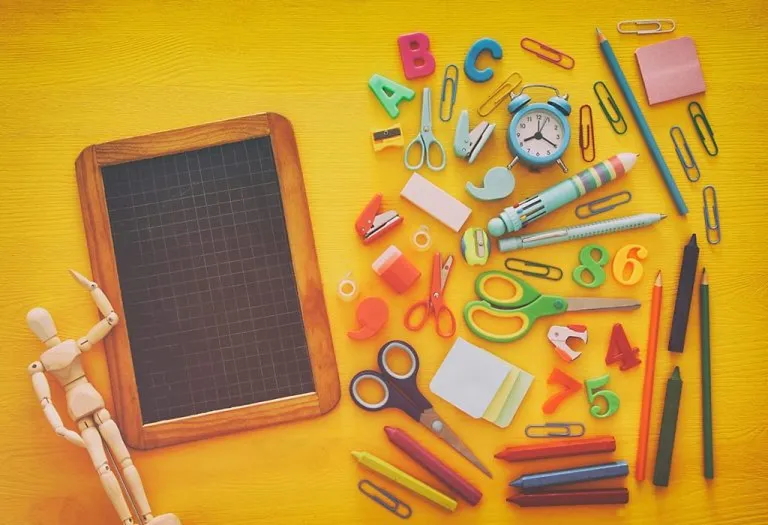




.svg)















